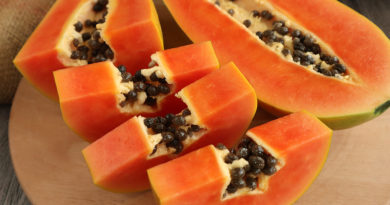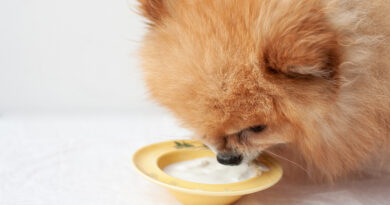Can Dogs Eat Ice Cream?
Featured image by © bigstockphoto.com / Javier Brosch
Is Ice Cream Bad For Dogs?
Summer season is a fun time for dogs as they get to do all the things they can’t in winter, like walking in the park and frolicking on the beach.
However, the warm temperatures can bring on thirst, and as you treat yourself to chilled treats like ice cream, you may not want to leave out your dogs. So, here comes the million-dollar question, “Can dogs eat ice cream?”
As tempting as it may be to indulge your best friend in this delicious treat, it’s best to avoid giving your dog any ice cream, however guilty you may feel.
Here are the three reasons why ice cream may be bad for your dogs:
Dogs Cannot Digest Dairy Well
Dairy is the main ingredient in ice cream, and unlike humans, the ability to digest dairy in a dog ends at weaning.
Feeding ice cream to dogs may result in gastrointestinal issues such as constipation, diarrhea, gas, or even vomiting. So, if you do not want your dog to suffer, these symptoms avoid offering them ice cream as a treat as much as possible.
Ice Cream Contains Excess Sugar
After dairy, sugar is the other main ingredient in ice cream, and sugar found in ice cream as the sweetener xylitol is toxic to dogs. It upsets the bacterial balance in the gut crucial in the digestion food, leading to diarrhea and vomiting.
Sugar, in the form of beet sugar, although natural, expands in size in your dog’s stomach, which can trick your dog into feeling full sooner than they are. Excess amounts of sugar can also trigger inflammation throughout your dog’s body and also put them at risk of:
- Obesity
- Blood sugar drops
- Liver failure
You might be tempted to argue that a small amount of ice cream may not harm your dog, but remember that little amount contains five times the number of calories your dog requires in a day.

Ice Cream Contains Compounds Toxic to Dogs
Milk and sugar are not the only ingredients in ice cream.
Ice cream comes in a variety of flavors, including chocolate, raisins, and peanut butter, and some of these flavor enhancers can be toxic to dogs.
While rarely fatal, when dogs ingest chocolate, it can result in illness.
Chocolate, a popular ingredient in ice cream, is toxic to dogs because it contains theobromine and traces of caffeine. Both compounds are proven diuretics, blood vessel dilators, heart stimulants, and smooth muscle relaxants in humans.
However, dogs cannot metabolize caffeine and theobromine well, which makes them more sensitive to the effects of these compounds.
What Are the Best Dog-Friendly Frozen Treats and Ice Cream Alternatives?
While all the news on “Can dogs eat ice cream?” is terrible, there are myriad frozen treats that are perfectly safe to feed to your dog in the hot summer months.
Any frozen treat that contains dog-friendly fruits and vegetables like melons, blueberries, pumpkin, and bananas are excellent choices. Also, raw milk yogurt treats (that have lower lactose levels) are easy on your pooch’s stomach, and won’t cause GI issues.
Other excellent frozen treat ideas include:
- Natural or organic baby food cubes
- Frozen bone broth cubes
- Cheese cubes
- Peanut butter popsicles
- Tuna popsicles
Final Thoughts
So, can dogs eat ice cream? Well, from a nutritional standpoint, the simple answer is no. However, as you can see, people do in fact give their dogs small quantities of plain ice cream, and the odd lick every now and then won’t harm them.
Ice cream contains dairy products, which can cause bloating, gas, constipation, diarrhea, and vomiting in your dog. While feeding your dog ice cream in small quantities is not dangerous, for dogs with obesity, allergy, or lactose intolerance issues, ice cream could present a genuine danger to their health.
If you must feed your dog “ice cream,” opt for yogurt-based frozen treats free from sugar and sweeteners, other doggy toxins like caffeine, chocolate, macadamia nuts, grapes, and raisins.
This way, you’ll be sure of giving your furry friend the summer and all-year-round treats they deserve without the associated guilt of harming their health.




